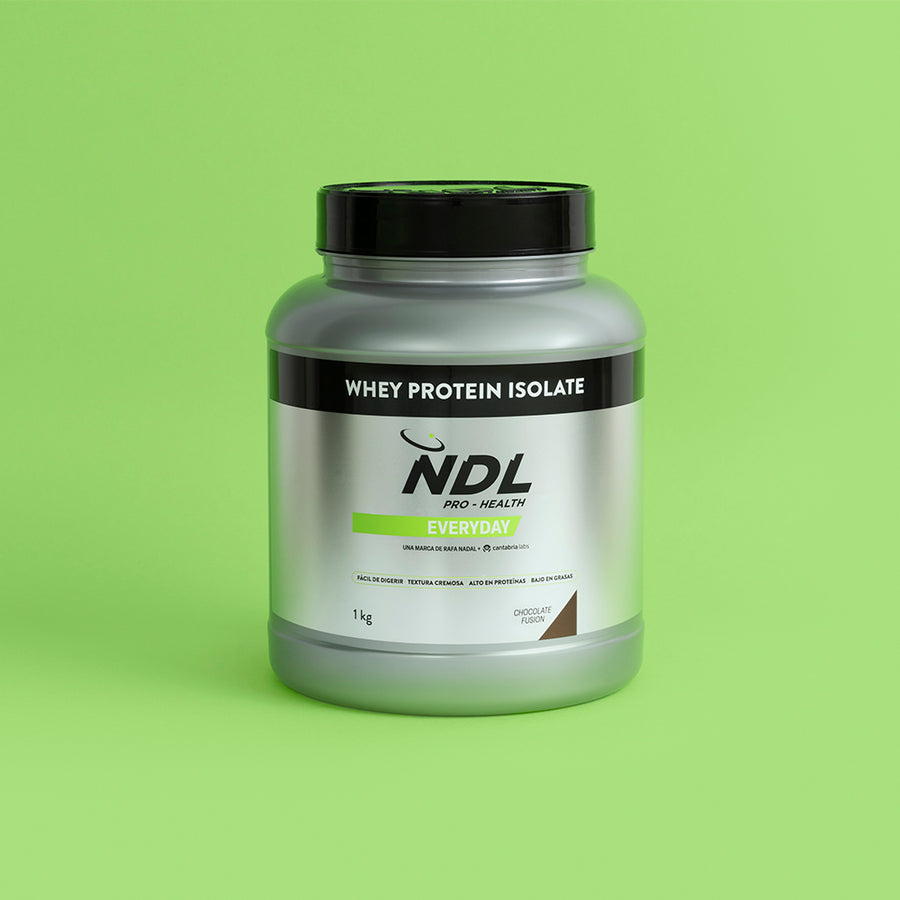Featured Products

Whey Protein Isolate
See productIf your goal is to gain muscle mass, you probably already know that strength training is critical. But for that effort in the gym to translate into visible results, nutrition - and in particular, protein - plays a key role. Protein is the nutrient responsible for repairing and building muscle tissue after exercise, and consuming the right amount can make the difference between making progress or stagnating.
In this article, we'll explain how much protein you need per day to gain muscle, how to calculate it based on your weight and training level, and how to effectively spread it throughout the day. We will also give you examples of protein-rich foods and tips to avoid common mistakes.
Why is protein essential for gaining muscle mass?
Protein is one of the essential macronutrients in the human body, and its main function in context of training is to promote the synthesis of new muscle fibers. Every time you train, specially with strength or endurance exercises, you generate small ruptures in the muscle tissue. For that muscle to repair and grow stronger, it needs an adequate supply of amino acids, the building blocks of protein.
In addition, when the goal is to increase muscle mass (hypertrophy), the body needs to be in positive nitrogen balance, which can only be achieved with a protein intake higher than what is needed in a maintenance state.
But, it is not just a matter of eating more protein, but doing it at the right time, with the right frequency and combining it with other nutrients that favor its absorption and effective use.
In short, without sufficient protein, the muscle cannot regenerate properly, and all the work in the gym can go unrewarded.

How much protein is needed per day to gain muscle mass?
The ideal amount of protein to gain muscle mass depends on several factors, such as body weight, level of training, type of exercise practiced and specific objective (muscle gain, definition, maintenance, etc.).
General recommendations:
For people training with the goal of gaining muscle, current studies recommend a daily intake of between 1.6 and 2.2 grams of protein per kilogram of body weight. For example:
- A 70 kg person should consume between 112 and 154 g of protein per day.
- For those in more intense phases of training or in a period of muscle definition, it may be closer to high range.
Differences according to the level of experience:
- Beginners: can obtain good results with intakes close to 1.6 g/kg.
- Intermediates and advanced: require more precision and can benefit from up to 2.2 g/kg, specially if they train very frequently or intensively.
Individual factors:
- Age: older people may need more protein to compensate for natural loss of muscle mass (sarcopenia).
- Sex: recommendations are similar for men and women, although the calculation is always based on weight.
- Body composition: people with a higher percentage of lean mass may benefit from a calculation based on muscle mass rather than total weight.
Is it better to spread protein throughout the day?
It's not just how much protein you consume that matters, but how you distribute it. To maximize muscle mass synthesis, experts recommend spreading your intake evenly throughout the day, rather than concentrating it in one or two meals.
Optimal distribution:Ideally, 0.4 to 0.55 g of protein per kilogram of body weight should be consumed at each of the 3 to 5 main meals of the day. For example, a 70 kg person could take between 28 and 38 g of protein per meal if they eat 4 meals a day.
This strategy helps to:
- Stimulate muscle protein synythesis on a continuous basis.
- Avoid prolonged periods without protein intake, which can slow down muscle growth.
- Make a better use of the body's resources to repair damaged tissue after training.
Post-workout timing: Protein intake after training is specially important,as the body is more receptive to absorbing nutrients and repairing muscle. Ingesting high-quality protein along with carbohydrates in the hour after exercise can enhance recovery and muscle growth.
Recommended protein sources
To gain muscle mass effectively, it is not only the quantity of protein you consume that matters, but also its quality. Protein sources very in their amino acid profile, their capacity to stimulate muscle synthesis.
Animal protein
These are considered complete proteins, as they contain all the essential amino acids in optimal proportions: lean meat (chicken, turkey, beef), fish (tuna, salmon, hake), eggs, dairy (fresh cheese, Greek yogurt, milk) and supplements (whey protein, casein).
These options are specially effective promoting hypertrophy because of their high leucine content, the amino acid most closely related to the activation of protein synthesis.
Plant-based protein
Some plant sources can also meet the requirements, specially if combined together: legumes (lentils, chickpeas, soybeans), whole grains (quinoa, brown rice, oats), nuts and seeds (almonds, chia, hemp) and vegetable protein powder (pea, rice, vegan blend).
For those following a plant-based diet, it is important to vary sources to obtain all essential amino acids and, if necessary, consider using supplements.
Protein supplements
Although not essential, supplements can be useful to meet daily requirements in practical way, specially after training or when you do not have access to a protein supplement.
Common mistakes when consuming protein to gain muscle mass
Although protein is keay in any olan to gain msucle mass, not everything goes. Here are some of the most common mistakes that can slow down your progress:
- Consuming too much protein: more is not always better. Exceeding 2.2 g/kg of body weigth on a regular basis does not provide additional benefits in healthy individuals and can displace other important nutrients in the diet, such as carbohydrates and healthy fats, which are also essential for performance and recovery.
- Neglecting the daily distribution: taking most of the protein in a single meal (for example, only at dinner) limits its effectiveness. As we saw earlier, the ideal is to spread it over several meals to keep muscle synthesis active throughout the day.
- Relying on supplements alone: protein shakes may be convenient, but they are not a substitute for a complete diet. A balanced diet with real food provides other key nutrients (vitamins, minerals, fiber) that supplements do not always provide.
- Not adapting your intake to your taining: not adjusting the amount of protein according to your workloads, goals or progress can stagnate your results. If you increase the intensity or volume of your workouts, you may also need to adjust your protein intake.
- Forgetting the rest of the diet: muscle growth does not depend on protein alone. If you do not consume enough total energy (calories), your body will not have enough resources to build muscle mass, no matter how much protein you take in.
In conclusion, protein is a fundamental pillar to gain muscle mass, but is not enough to include it randomly in your diet. Knowing how much you need, how to distribute it throughout the day and from which sources to obtain it is key to maximizing your results.
Remember that every body is different. If you want to customize your intake accurately and safely, it is best to consult a sports nutritionist to help you adapt your diet to your goals, lifestyle and type of training.

From the NDL Pro-Health team we will provide you with tips to maintain a healthy lifestyle. Sharing knowledge and product recommendations to offer optimal solutions for your daily routine, for your workouts and subsequent recovery, all with the goal of helping you achieve physical and mental wellness.

















